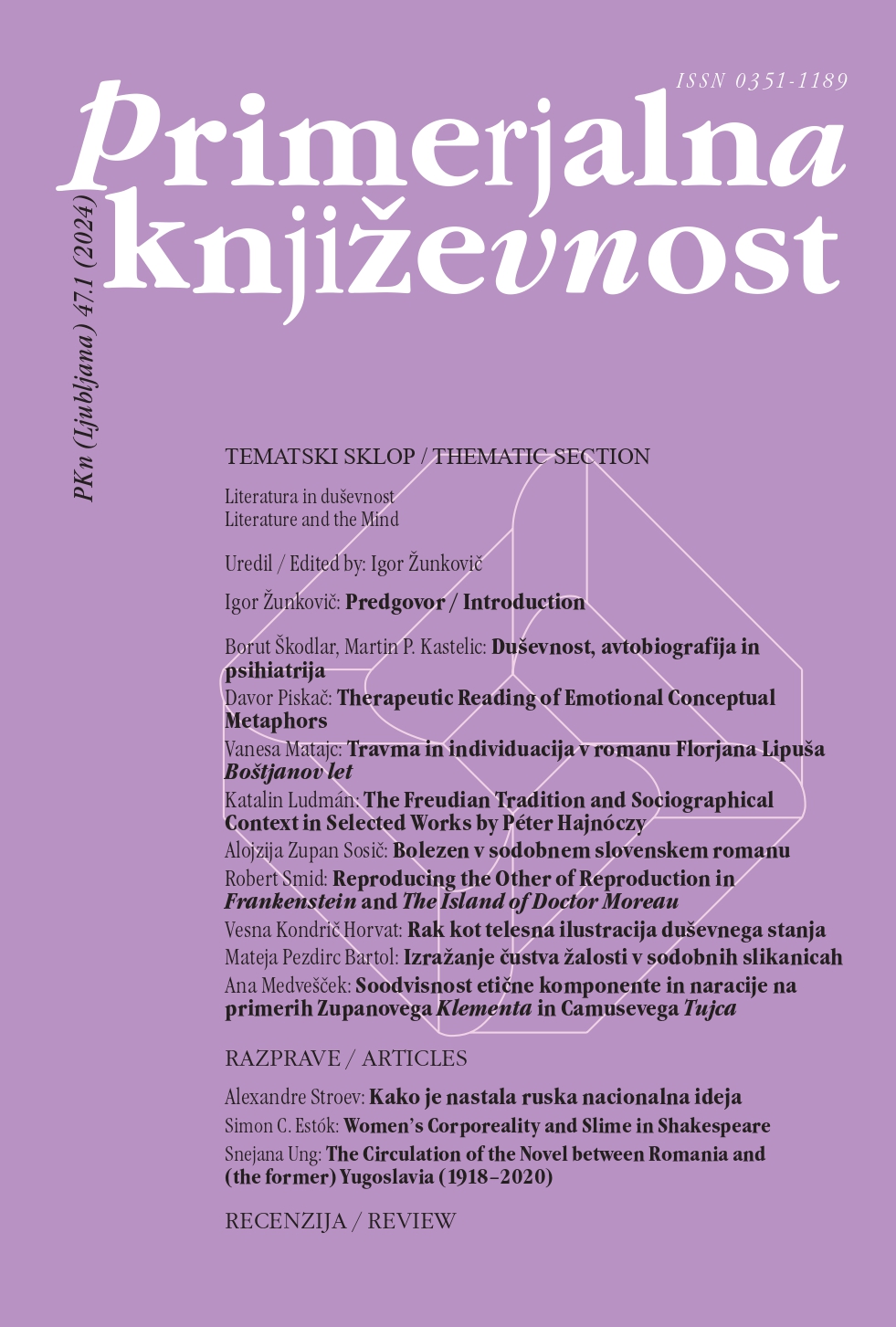Cancer as a Physical Illustration of the Mental State: About Fritz Zorn’s Mars
DOI:
https://doi.org/10.3986/pkn.v47.i1.07Keywords:
Swiss literature, autobiographical writing, Zorn, Fritz: Mars, Muschg, Adolf, illness, social conditioning, cancerAbstract
The article analyses the book Mars by the Swiss author Fritz Zorn. A cult book from the 1970s, Mars features a narrator, a young teacher from a wealthy, bourgeois family, who accuses both his family and Swiss society of causing his cancer, after a prolonged period of depression. Zorn died of cancer before Mars was published. The publication of the book was recommended by the renowned writer Adolf Muschg who labelled himself a hypochondriac and wrote extensively about psychosomatic illnesses that afflict modern humans, since they cannot express their anguish otherwise. Fritz Zorn also described his illness as psychosomatic. But Muschg also said that illness is only a motivation for writing, while the real goal is always aesthetic ambition. Nevertheless, absent the illness, he might never have become a writer. The same obviously holds true for the author of Mars, a book that one should read not only as social critique but simultaneously as fiction. The analysis demonstrates how Zorn’s book, with its salient autobiographical feel, tries to outline the history of his psychosomatic illness. At the end the author calls himself “god’s carcinoma” and claims he was driven to this stage through a childhood, youth and the beginning of employment as a teacher that were only apparently fortunate. The whole book should be considered as a declaration of war on a false bourgeois society, other victims of which were Zorn’s “poor parents,” as he labels them throughout the book.
References
Aichinger, Ingrid. »Selbstbiographie«. Reallexikon der deutschen Literaturgeschichte, de Gruyter, 1958, str. 801–819.
Basler, David, in Walter Baumgärtner, ur. Angst und Zorn. »Mars« – zehn Jahre danach. Strapazin, 1986.
Beutler, Maja. Fuss fassen. Zytglogge, 1980.
Burger, Hermann. Die Künstliche Mutter. S. Fischer, 1982.
Dierks, Manfred. Adolf Muschg. Lebensrettende Phantasie. C. H. Beck, 2004.
Enders, Ria. ZORN. Theaterstück nach dem Buch Mars von Fritz Zorn – Uraufführung, premiera 21. 2. 1991, Schauspielhaus-Keller.
Fava, Giovanni A., in Nicoletta Sonino. »Psychosomatic Medicine: Emerging Trends and Perspectives«. Psychother Psychosom, let. 69, 2000, str. 184–197.
Kondrič Horvat, Vesna. »Življenje kot estetska izkušnja v literarnih delih Erice Pedretti«. Primerjalna književnost, let. 46, št. 2, 2023, str. 63–73.
Miholič, Mojca. »Psihosomatske bolezni«. https://www.abczdravja.si/psihologija/psihosomatske-bolezni/. Dostop 6. 9. 2023.
Meerwein, Fritz. »Der letzte Lebensabschnitt eines krebskranken Lehrers«. Angst und Zorn. »Mars« – zehn Jahre danach, ur. David Basler in Walter Baumgärtner, Strapazin, 1986, str. 7–9.
Muschg, Adolf. Literatur als Therapie? Ein Exkurs über das Heilsame und das Unheilbare. Frankfurter Vorlesungen. Suhrkamp, 1981.
Muschg, Adolf. »Zgodba nekega rokopisa«. Fritz Zorn, Mars, predgovor Adolf Muschg, prev. Marko Trobevšek, Modrijan, 2009, str. 7–22.
Statius, Pierre. »‘I Was Educated to Death’. A Reading of Fritz Zorn’s Mars«. Le Télémaque, let. 62, št. 2, 2022, str. 69–82.
Storz, Claudia. Jessica mit Konstruktionsfehlern. Benziger, 1977.
Winnicott, D. W. »Ego Distortion in Terms of True and False Self«. The Maturational Process and the Facilitating Environment: Studies in the Theory of Emotional Development, International Universities Press, 1960, str. 140–157.
Wolman, Benjamin B. Psychosomatic Disorders. Springer, 1988.
Zorn, Fritz. Mars. S predgovorom Adolfa Muschga. Prev. Marko Trobevšek, Modrijan, 2009.
Zürcher, Urs. »Die Sprache des Zorns«. Literarischer Monat, let. 34, 2018, https://literarischermonat.ch/die-sprache-des-zorns/. Dostop 4. 4. 2024.


